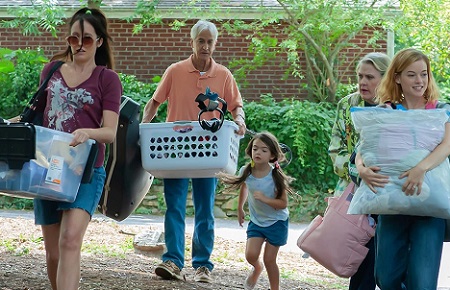A Little Prayer Review
As A Little Prayer begins, the voice of an unseen singer floats in the morning air of a strikingly leafy neighborhood.
The spirituals he overhears several times during this quiet drama take on the role of a disembodied character, eliciting reactions from other characters that help define who they are. Some hear only noise, an intrusion, something to complain about.
But for Bill and his daughter-in-law, Tammy, soul-searching plays beautifully played by David Strathairn and Jane Levy, the songs are enchanting, a mystery to be savored.
Bill and Tammy are, as she says, kindred spirits, but that’s not to say they’re completely in sync. Their bond is the Heart of writer-director Angus MacLachlan’s sensible film, yet there’s also a difference between what Bill wants to believe and how things are.
On top of his third feature, After Goodbye to All That and Abundant Acreage Available, MacLachlan examines generational bonds and rifts, the fallout of trauma, and the opportunity for change.
As in his screenplay for Junebug, the film that put him on the map as a film writer and made Amy Adams a star, the setting for this comparatively restrained tale of family secrets is North Carolina—specifically, McLachlan’s hometown of Winston-Salem.
Filmmaking is straightforward, with fuss-free camerawork by Scott Miller, fluent editing by Tricia Holmes, and live-in design contributions from Diana Rice and Jenna Moody, keeping the backstory to a bare and effective minimum.
It has been suggested that Tammy grew up in hard-knock Kentucky. She now works part-time at Target and shares her in-laws’ home with her son, David (Will Pullen). Imbued by Levi with radiant humility and a quiet inner fire, Tammy is the old soul of David’s childish man.
When we first see them in bed together, David has wrapped himself around her, but the emotional distance between them is palpable. He sleeps, and she thinks, listening to an unknown singer (Martha Bassett’s voice).
Conversely, Tammy and Bill joke like old friends at breakfast in the modest main house. He owns a sheet metal company founded by his father, where David works.
They are both military veterinarians, and it has become a ritual to treat their crews on weekly nights at the VFW post. The essential Celia Weston plays Bill’s wife, Venida, a sensible woman with strong opinions and observations who is unhappy with her son working long hours in his office.
She believes that her husband is the taskmaster to blame. But Bill learns the truth, that David and office assistant Narsedalia ( Dascha Orange is the New Black’s Polanco ) are having an affair, his suspicions confirmed by Narsedalia’s friend Bethany (ASHLEY SHELTON, AWESOME). Confronting his tight-lipped son and warning him to “straighten up and fly right,” Bill pushes him further away.
Like Weston, a returning member of the MacLachlan troupe, Camp channels a noisy, chaotic alter ego that makes the strip the polar opposite of Tammy.
Keeping what she knows about David from Venida and Tammy and later hiding concerns about a possible pregnancy, a lot is going on beneath the low-key surface.
Until the unannounced arrival of Bill and Venida’s daughter, Patti (Anna Camp), with her young, mostly incontinent daughter, Hadley (Billie Roy) – no one raises a voice to dispel the illusion that all is well.
Extraordinarily paranormal, Patti is on the run from a troubled marriage in Virginia, not for the first time. She arrived without money or a job but was sure to pack a metal detector to search for treasure in her parent’s backyard.
Strathairn’s fine and nuanced performance exude complacency, old-school morality, and a certain obliviousness.
Given that both of his children are facing adversities, one bottled up and the other floundering, it’s only natural that Bill begins to wonder if his parenting is to blame. Believing he’s one step ahead of everyone else, Bill is dealing with some serious stuff — about a woman’s autonomy, for starters, and the mental wounds of an ex-soldier.
As Weston Knows Venida tells him through tears, “My heartbreak and your heartbreak aren’t the most important things here.”
Bill’s resolve to clean up his kids’ mess is as much about easing his conscience as it is about improving their lives.
Look at how he hands a check to his adult daughter: a few seconds into an excellent Strathairn transforms a wordless gesture into an expression of mock selflessness entwined with sincere hope – a small prayer.
In an eloquent change between scenes, MacLachlan walks from a cemetery to a funeral home. At the cemetery, Venida, dressed as a tour guide in colonial-era garb, explains the Moravians’ no-nonsense approach to burial.
Outside the funeral home, David chats with a fellow veteran (Steve Coulter) after services for another vet. There is nothing sentimental in his words about the lasting effects of war.
The writer-director weaves in such details without reducing people to types defined by political prejudices or oversimplification.
He does not praise or insult, and he is not interested in showing off hot-button topics, though he does explore their day-to-day reality; As a woman in a medical office ( Keisha Lashon Tillis ) tells Tammy in the most charged scene of the film, “People always have their strong opinions.”
A Little Prayer’s emotional impact doesn’t explode as much as it unfolds, a series of quiet epiphanies, well observed and elegant in their strange yearning.
For Tammy and Bill, these include bare faces and lewd revelations, gospel hymns from a neighborhood singer, and, in a beautiful finale sequence, visions of a 19th-century painter.
Most of the characters in this open-ended and cautiously hopeful drama try to hold onto something. At its center are two people reaching out to the ether daily, learning to let go.

